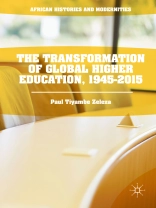This book explores some of the major forces and changes in higher education across the world between 1945 and 2015. This includes the explosions of higher education institutions and enrollments, a development captured by the notion of massification. There were also profound shifts in the financing and economic role of higher education reflected in the processes of privatization of universities and curricula realignments to meet the shifting demands of the economy. Moreover, the systems of knowledge production, organization, dissemination, and consumption, as well as the disciplinary architecture of knowledge underwent significant changes. Internationalization emerged as one of the defining features of higher education, which engendered new modes, rationales, and practices of collaboration, competition, comparison, and commercialization. External and internal pressures for accountability and higher education’s value proposition intensified, which fuelled struggles over access, affordability, relevance, and outcomes that found expression in the quality assurance movement.
قائمة المحتويات
Introduction.-.Chapter 1 The Postwar Boom: The Universalization of Higher Education.-.Chapter 2 Money Matters: Financial and Occupational Disruptions.-.Chapter 3 Disciplining Knowledges: Ruptures in Academic Systems.-.Chapter 4 Global Village: The Competitive Challenges of Internationalization.-.Chapter 5 Quality Control: Struggles for Accountability and Value.-.Conclusion.
عن المؤلف
Paul Tiyambe Zeleza is Vice Chancellor of the United States International University-Africa. Previously he was a professor and held senior administrative positions in Canada and the United States. He is the author of more than two dozen books several of which have won international awards.












